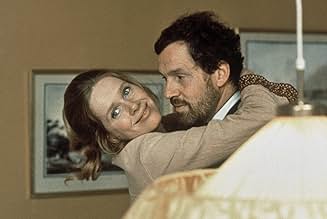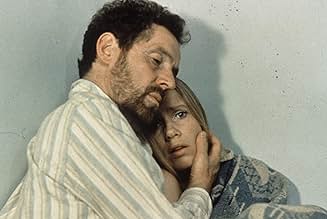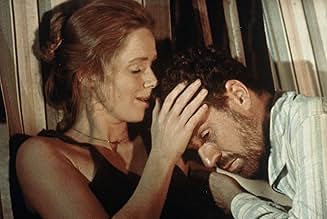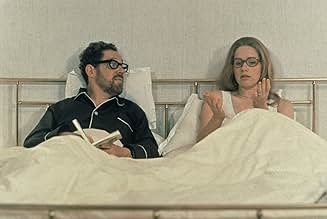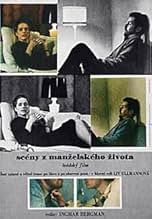IMDb RATING
8.5/10
18K
YOUR RATING
Ten years within the marriage of Marianne and Johan.Ten years within the marriage of Marianne and Johan.Ten years within the marriage of Marianne and Johan.
- Awards
- 3 wins total
Browse episodes
Featured reviews
10CSM126-1
Johan and Marianne have been happily married for ten years. Following the rough choice to abort their child, the marriage begins to fall apart. Theirs is a marriage of convenience anyway, so it is no surprise that they have looked elsewhere for love and comfort. One day, Johan runs away with another woman, and the process of divorce begins. "Scenes from a Marriage" (Scener ur ett aktenskap) is an intense and personal look at the sanctity of marriage in a world where divorce is in vogue.
"Scenes" begins with Johan and Marianne being interviewed for a magazine article about their perfect marriage. Johan is confident in his happiness. He loves his wife, has fathered two children, and has a well-paying job. Marianne is sure of nothing, other than that she's happy. She tries to talk about her future, but the photographer cuts her off for a picture. She never gets to finish her thought. One wonders what she would have said if she'd gotten to same amount of time to speak as Johan did.
During the course of an epic five-hour ride, the two will switch places. Johan will become uncertain of what he wants, and Marianne will become liberated and truly happy. It's what happens in between that fascinates. "Scenes from a Marriage" focuses on the in between moments in life. Most of the time there are only two characters on screen at a time. Filmed in an intimate, documentary-like style, the film gives us the feeling that we're watching a home movie about the down time in the couple's life. This is when they real emotions come to the surface. Johan reveals his passion for Paula, the woman who has seduced him away from Marianne. Marianne, reserved in public, let's her anger, pain, and jealousy flow freely when they are alone together.
It is this that makes the film work. The film was written and directed by Swedish master Ingmar Bergman, a man who knows how to create arrestingly real drama. Bergman knows that the little moments in life are utterly more fascinating then the overblown public moments that most movies show. By allowing us into these personal moments, Bergman allows Johan and Marianne to become like old friends to the viewer, and that makes the story all the more impactful.
The performances by Liv Ullman and Erland Josephson as Marianne and Johan are nothing short of revelatory. Let's face it, most actors don't shoot for the stars in television productions. Ullman and Josephson treat "Scenes" like any one of their theatrical films. This approach is much appreciated. I only wish they could teach American TV actors a thing or two. Ullman and Josephson deliver more meaningful and powerful performances in the course of five hours than half of the American network line-ups could provide in 5 seasons.
Take, for example, the scene where Marianne discovers that she is the last person to know about Johan's infidelity. The camera gets in close on Ullman's face to reveal all the little details of her expression. Ullman's face is a mask of horror and shame. Her eyes are crying out in despair much louder than her voice can.
There is another fantastic scene in which Marianne who, in the ultimate irony, is a divorce lawyer listens to a client discuss her loveless marriage. The comparison to Marianne and Johan's marriage is undeniable. The look on Marianne's face as she sees her future self in her client is hard to describe, but undeniably affecting.
Johan has less emotional depth, as one of the main plot points is that Paula saps the life out of him as the relationship progresses. However, look at the earliest scenes of the film, where he is overflowing with happiness. The joy in his eyes and his voice are so real it's hard to believe that the whole thing was carefully scripted by Bergman rather than improvised by Josephson.
It is said that, following the initial airing of "Scenes from a Marriage" on Scandinavian TV, the divorce rate in Scandinavia grew immensely. More surprising is that Ingmar Bergman was, and still is, delighted by this fact. The film does provide somewhat of an argument for staying together (Johan and Marianne bounce back and forth on th divorce issue several times) and ultimately, as far as I understand, says that even the most strained relationships can be helped. I suppose it is all up to individual interpretations.
I think that "Scenes from a Marriage" is a film about communication. The lack of communication, and the inability to communicate at all, are the major contributing factors in the breakdown of Johan and Marianne's relationship. It isn't until the divorce papers come that the communication begins. A lack of communication with their own emotions prevents the two from seeing any way out other than divorce--they simply assume that it's too late and that all is said and done. It doesn't have to be that way, and "Scenes from a Marriage" will provide a wake up call to anyone who thinks it does.
"Scenes" begins with Johan and Marianne being interviewed for a magazine article about their perfect marriage. Johan is confident in his happiness. He loves his wife, has fathered two children, and has a well-paying job. Marianne is sure of nothing, other than that she's happy. She tries to talk about her future, but the photographer cuts her off for a picture. She never gets to finish her thought. One wonders what she would have said if she'd gotten to same amount of time to speak as Johan did.
During the course of an epic five-hour ride, the two will switch places. Johan will become uncertain of what he wants, and Marianne will become liberated and truly happy. It's what happens in between that fascinates. "Scenes from a Marriage" focuses on the in between moments in life. Most of the time there are only two characters on screen at a time. Filmed in an intimate, documentary-like style, the film gives us the feeling that we're watching a home movie about the down time in the couple's life. This is when they real emotions come to the surface. Johan reveals his passion for Paula, the woman who has seduced him away from Marianne. Marianne, reserved in public, let's her anger, pain, and jealousy flow freely when they are alone together.
It is this that makes the film work. The film was written and directed by Swedish master Ingmar Bergman, a man who knows how to create arrestingly real drama. Bergman knows that the little moments in life are utterly more fascinating then the overblown public moments that most movies show. By allowing us into these personal moments, Bergman allows Johan and Marianne to become like old friends to the viewer, and that makes the story all the more impactful.
The performances by Liv Ullman and Erland Josephson as Marianne and Johan are nothing short of revelatory. Let's face it, most actors don't shoot for the stars in television productions. Ullman and Josephson treat "Scenes" like any one of their theatrical films. This approach is much appreciated. I only wish they could teach American TV actors a thing or two. Ullman and Josephson deliver more meaningful and powerful performances in the course of five hours than half of the American network line-ups could provide in 5 seasons.
Take, for example, the scene where Marianne discovers that she is the last person to know about Johan's infidelity. The camera gets in close on Ullman's face to reveal all the little details of her expression. Ullman's face is a mask of horror and shame. Her eyes are crying out in despair much louder than her voice can.
There is another fantastic scene in which Marianne who, in the ultimate irony, is a divorce lawyer listens to a client discuss her loveless marriage. The comparison to Marianne and Johan's marriage is undeniable. The look on Marianne's face as she sees her future self in her client is hard to describe, but undeniably affecting.
Johan has less emotional depth, as one of the main plot points is that Paula saps the life out of him as the relationship progresses. However, look at the earliest scenes of the film, where he is overflowing with happiness. The joy in his eyes and his voice are so real it's hard to believe that the whole thing was carefully scripted by Bergman rather than improvised by Josephson.
It is said that, following the initial airing of "Scenes from a Marriage" on Scandinavian TV, the divorce rate in Scandinavia grew immensely. More surprising is that Ingmar Bergman was, and still is, delighted by this fact. The film does provide somewhat of an argument for staying together (Johan and Marianne bounce back and forth on th divorce issue several times) and ultimately, as far as I understand, says that even the most strained relationships can be helped. I suppose it is all up to individual interpretations.
I think that "Scenes from a Marriage" is a film about communication. The lack of communication, and the inability to communicate at all, are the major contributing factors in the breakdown of Johan and Marianne's relationship. It isn't until the divorce papers come that the communication begins. A lack of communication with their own emotions prevents the two from seeing any way out other than divorce--they simply assume that it's too late and that all is said and done. It doesn't have to be that way, and "Scenes from a Marriage" will provide a wake up call to anyone who thinks it does.
I used to think that I knew a thing or two about marriage having been married for as long as I have but nothing from my experience had prepared me for the merciless and deep dissection of Marriage: Bergman Style. When we meet Johan and Marianne for the first time, they have been happily (or so it seems) married for ten years. They have two daughters; they are still young, very attractive, healthy, educated, well off, and they seem to love each other very much. But Bergman is not interested in happy families all happy families are happy in the similar ways. Like Tolstoy many years before him, Bergman explores the second part of the formula All unhappy families are unhappy in their unique ways.
Bergman and his leading actors Liv Ullmann and Arland Josephson give one of the most truthful, honest, heartbreaking and credible portraits of a couple, one of the most intense character studies ever done on film. For five hours, we share twenty years from the lives of Johan and Marianne as well as their love, hate, misunderstandings, insecurities, anger, jealousy, denial, sadness, pain, despair, and loss. We witness the moments of incredible tenderness and unexpected and shocking violence, both physical and mental. There are no depth that they have not descended in the search of themselves and the meaning of their relationship.
There are actually four marriages Bergman studies in "Scenes from a Marriage" none of them is happy, all are miserable. Bergman does not deny the possibility of finding a soul mate but his opinion on the modern marriage is quite pessimistic.
It felt like Bergman was saying - marriage is dead, long live love. For hours after the film was over, I could not shake off the sadness and pessimism of it. Only later I realized that even if four marriages in Bergman's film were disastrous, it does not necessarily mean that all couples in the world are or have to be that miserable. Bergman wrote and directed Scenes from a Marriage in 1973 when he was in his 5-th marriage, the one that would last for 24 years until his wife died. He brought in the screenplay (I think so but I may be wrong) the bitterness, resentment, anger and disappointments from his previous four marriages - maybe that's why the film is sometimes almost impossible to watch?
"Scenes from a Marriage" is a masterpiece but it may leave you devastated and emotionally exhausted. I watched the original 5-hours TV version and did not even bother with three hours version. 10/10
Bergman and his leading actors Liv Ullmann and Arland Josephson give one of the most truthful, honest, heartbreaking and credible portraits of a couple, one of the most intense character studies ever done on film. For five hours, we share twenty years from the lives of Johan and Marianne as well as their love, hate, misunderstandings, insecurities, anger, jealousy, denial, sadness, pain, despair, and loss. We witness the moments of incredible tenderness and unexpected and shocking violence, both physical and mental. There are no depth that they have not descended in the search of themselves and the meaning of their relationship.
There are actually four marriages Bergman studies in "Scenes from a Marriage" none of them is happy, all are miserable. Bergman does not deny the possibility of finding a soul mate but his opinion on the modern marriage is quite pessimistic.
It felt like Bergman was saying - marriage is dead, long live love. For hours after the film was over, I could not shake off the sadness and pessimism of it. Only later I realized that even if four marriages in Bergman's film were disastrous, it does not necessarily mean that all couples in the world are or have to be that miserable. Bergman wrote and directed Scenes from a Marriage in 1973 when he was in his 5-th marriage, the one that would last for 24 years until his wife died. He brought in the screenplay (I think so but I may be wrong) the bitterness, resentment, anger and disappointments from his previous four marriages - maybe that's why the film is sometimes almost impossible to watch?
"Scenes from a Marriage" is a masterpiece but it may leave you devastated and emotionally exhausted. I watched the original 5-hours TV version and did not even bother with three hours version. 10/10
After "Wild Strawberries," this is perhaps my favorite Bergman movie, though be warned: it will take the wind out of you, especially if you watch the full five-hour version in a condensed period of time, as I did.
Liv Ullmann and Erland Josephson create perhaps too realistic a version of marriage in this emotionally bruising film. When Marianne (Ullmann) finds out that Johan (Josephson) has been cheating on her and has decided to leave her, the safe, secure world she has built around her crumbles. She plays Marianne as a wife blind to her own husband's unhappiness and embarrassed that she didn't see it coming, and her's is a convincing portrait of a woman whose partner has decided long before her that what they have isn't working.
Josephson makes Johan into a contemptible ass, but he still manages to earn our sympathy. It's easy to dislike Johan but difficult to hate him, so we're in many respects thrust into the same emotional straight jacket as Marianne.
The saddest thing about "Scenes from a Marriage" is how much affection and love there actually is between these two people, and how it's going to waste. When they get angry, they lash out to hurt one another with words and even with fists at one point. There are tears, laughs, reveries. It's obvious that there wouldn't be the need for all this if there wasn't so much ingrained affection between them, and it's tragic to see them become each other's enemy rather than each other's ally.
For a very good if not quite as brilliant sequel to this film, see "Saraband," which has Marianne visiting Johan for the first time in many years after each has established a life of his/her own without the other. It brings a peaceful sense of closure and in many ways stitches up the raw wound left by the first film.
Grade: A
Liv Ullmann and Erland Josephson create perhaps too realistic a version of marriage in this emotionally bruising film. When Marianne (Ullmann) finds out that Johan (Josephson) has been cheating on her and has decided to leave her, the safe, secure world she has built around her crumbles. She plays Marianne as a wife blind to her own husband's unhappiness and embarrassed that she didn't see it coming, and her's is a convincing portrait of a woman whose partner has decided long before her that what they have isn't working.
Josephson makes Johan into a contemptible ass, but he still manages to earn our sympathy. It's easy to dislike Johan but difficult to hate him, so we're in many respects thrust into the same emotional straight jacket as Marianne.
The saddest thing about "Scenes from a Marriage" is how much affection and love there actually is between these two people, and how it's going to waste. When they get angry, they lash out to hurt one another with words and even with fists at one point. There are tears, laughs, reveries. It's obvious that there wouldn't be the need for all this if there wasn't so much ingrained affection between them, and it's tragic to see them become each other's enemy rather than each other's ally.
For a very good if not quite as brilliant sequel to this film, see "Saraband," which has Marianne visiting Johan for the first time in many years after each has established a life of his/her own without the other. It brings a peaceful sense of closure and in many ways stitches up the raw wound left by the first film.
Grade: A
Enormous success it had with audiences of Swedish TV, where it was shown in six episodes paved way for its theatrical release. This however called for compromising almost half the original length of celluloid.
As one of more easily understandable Bergman films, "Scenes From A Marriage" met much enthusiasm on both sides of the Atlatic.
The film showcases great two of Ingmar Bergman's favorite actors. Both Liv Ullman and Erland Josephson give lively mature performances, lauded by critics.
Being a down-to-earth family drama with strong social commentary of great relevance, "Scenes From A Marriage" has something important to convey. It is a meaningful picture.
It reflects on the nature of relationship between man and woman. It invites us to ponder on this basic issue, a cornerstone of human society Although not quite in the same league with bona-fide Bergman classics like "The Seventh Seal" and "Persona", "Scenes From A Marriage" remains a powerful movie.
As one of more easily understandable Bergman films, "Scenes From A Marriage" met much enthusiasm on both sides of the Atlatic.
The film showcases great two of Ingmar Bergman's favorite actors. Both Liv Ullman and Erland Josephson give lively mature performances, lauded by critics.
Being a down-to-earth family drama with strong social commentary of great relevance, "Scenes From A Marriage" has something important to convey. It is a meaningful picture.
It reflects on the nature of relationship between man and woman. It invites us to ponder on this basic issue, a cornerstone of human society Although not quite in the same league with bona-fide Bergman classics like "The Seventh Seal" and "Persona", "Scenes From A Marriage" remains a powerful movie.
Scenes from a Marriage is a film about a breakup. We are not talking about some ephemeral youthful relationship, but a happy marriage of many years between a couple who truly feel they are happy together.
Yet cracks become visible, and soon the whole structure comes tumbling down as the once happy couple spends the next 15 years of their lives trying to make sense of it all. The film (aired in Sweden as a 6 part miniseries) is 5 hours of the most intense, painful, emotional conversations ever committed to celluloid. It is filmed almost entirely in close-up with sparse lighting and no music. I have watched it multiple times and by the end of the emotionally grueling experience it feels as though you have lived through each moment Johan and Marianne have experienced, no matter how far from your actual life any one detail might be.
That may not seem like the most pleasant viewing experience, but I should add that the film is not quite as harrowing as my description might make it seem. Yes, intense doesn't even begin to describe it, but Bergman has created the film with such honesty that there is no manipulation or unnecessary suffering. Even the immortal Eric Rohmer has never displayed this level of understanding into basic human relationships. Again, there is no manipulation here; Bergman would never stoop so low as to include suffering merely for the sake of additional drama. What is actually present in every second of the film is simply many lifetimes worth of wisdom on love, loss and moving on.
There are no easy answers in Scenes from a Marriage. The film is an emotional roller-coaster from start to finish. The person who is handling things the best will just as often have hit a new low when they are revisited down the road. The couple's bond will never disappear and yet they can never be what they were to each other. Old feelings resurface, old wounds reopen, old passions return and throughout it all Sven Nykvist's camera does not flinch. No film has done more with such a stark palate of images.
What elevates the film to "second favorite movie ever" level for me is not just the insight into human interaction, though that is my favorite subject matter in film. Scenes from a Marriage is not content to merely show what the loss of a loved one is like, Bergman also has a point beyond a simple documentation of the dissolution of a marriage.
By the final chapter, perfectly titled "In the Middle of the Night in a Dark House Somewhere in the World", an epiphany is reached. Johan and Marianne do not necessarily "get back together" or "never see each other again", but a certain level of acceptance is reached. That which can never be understood, which no one can put into words, and which has no solution is somehow grasped in the final scenes of this magnificent movie. Like a fleeting glimpse of the sun from inside a cave, all the mysteries of life and love briefly make sense.
While I never leave a viewing of Scenes from a Marriage feeling any less confused about the grand questions of life, I can't help but suspect that for a time during its brief 5 hours I almost had it. What more could any artist want from their viewer?
Yet cracks become visible, and soon the whole structure comes tumbling down as the once happy couple spends the next 15 years of their lives trying to make sense of it all. The film (aired in Sweden as a 6 part miniseries) is 5 hours of the most intense, painful, emotional conversations ever committed to celluloid. It is filmed almost entirely in close-up with sparse lighting and no music. I have watched it multiple times and by the end of the emotionally grueling experience it feels as though you have lived through each moment Johan and Marianne have experienced, no matter how far from your actual life any one detail might be.
That may not seem like the most pleasant viewing experience, but I should add that the film is not quite as harrowing as my description might make it seem. Yes, intense doesn't even begin to describe it, but Bergman has created the film with such honesty that there is no manipulation or unnecessary suffering. Even the immortal Eric Rohmer has never displayed this level of understanding into basic human relationships. Again, there is no manipulation here; Bergman would never stoop so low as to include suffering merely for the sake of additional drama. What is actually present in every second of the film is simply many lifetimes worth of wisdom on love, loss and moving on.
There are no easy answers in Scenes from a Marriage. The film is an emotional roller-coaster from start to finish. The person who is handling things the best will just as often have hit a new low when they are revisited down the road. The couple's bond will never disappear and yet they can never be what they were to each other. Old feelings resurface, old wounds reopen, old passions return and throughout it all Sven Nykvist's camera does not flinch. No film has done more with such a stark palate of images.
What elevates the film to "second favorite movie ever" level for me is not just the insight into human interaction, though that is my favorite subject matter in film. Scenes from a Marriage is not content to merely show what the loss of a loved one is like, Bergman also has a point beyond a simple documentation of the dissolution of a marriage.
By the final chapter, perfectly titled "In the Middle of the Night in a Dark House Somewhere in the World", an epiphany is reached. Johan and Marianne do not necessarily "get back together" or "never see each other again", but a certain level of acceptance is reached. That which can never be understood, which no one can put into words, and which has no solution is somehow grasped in the final scenes of this magnificent movie. Like a fleeting glimpse of the sun from inside a cave, all the mysteries of life and love briefly make sense.
While I never leave a viewing of Scenes from a Marriage feeling any less confused about the grand questions of life, I can't help but suspect that for a time during its brief 5 hours I almost had it. What more could any artist want from their viewer?
Did you know
- TriviaAccording to an interview with Ingmar Bergman, after the TV mini-series was broadcast in Sweden, the divorce rate in Sweden increased substantially and the number of married couples who seek marriage counseling also doubled.
- Crazy creditsThe end credits aren't shown on-screen but read by director and writer Ingmar Bergman, while "a beautiful picture of Fårö" is shown (different for each episode). Bergman himself is not credited at all.
- Alternate versionsBergman prepared a four-hour version of "Scenes from a Marriage," hoping it would be shown as a two-part film. It never appeared in the US, although the original six-hour mini-series was shown on PBS after the 168 minute cut had played theatrically.
- ConnectionsEdited into Scènes de la vie conjugale (1974)
- SoundtracksConcerto for violin, strings & continuo in B flat major, Op. 10, No. 1
(uncredited)
Written by Tomaso Albinoni
A short extract is played during the very beginning and end of each episode (it's not featured in the theatrical version)
- How many seasons does Scenes from a Marriage have?Powered by Alexa
Details
- Release date
- Country of origin
- Official site
- Language
- Also known as
- Scenes from a Marriage
- Filming locations
- Production company
- See more company credits at IMDbPro
- Runtime50 minutes
- Sound mix
- Aspect ratio
- 4:3
Contribute to this page
Suggest an edit or add missing content

Top Gap
By what name was Scènes de la vie conjugale (1973) officially released in India in English?
Answer
